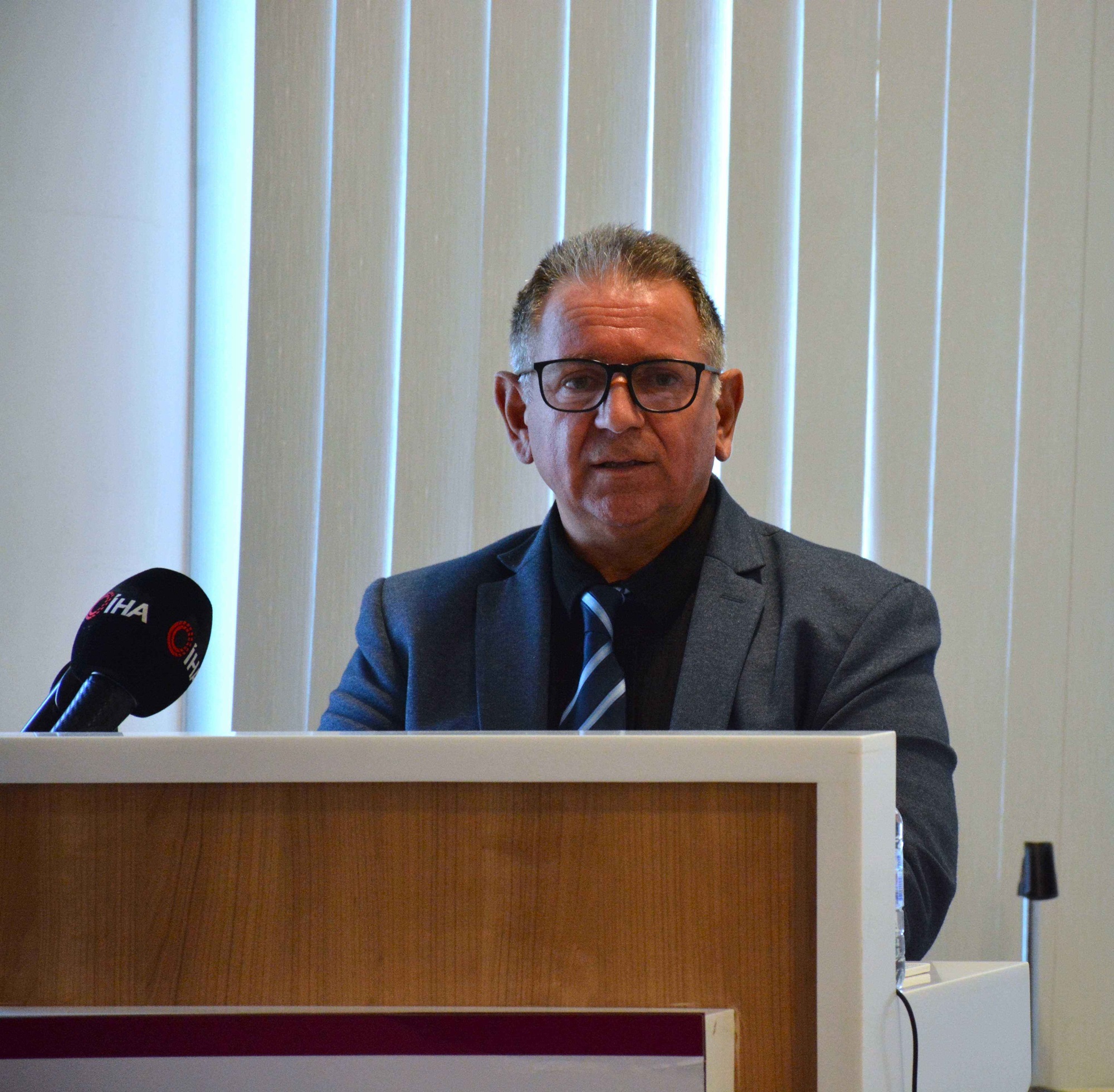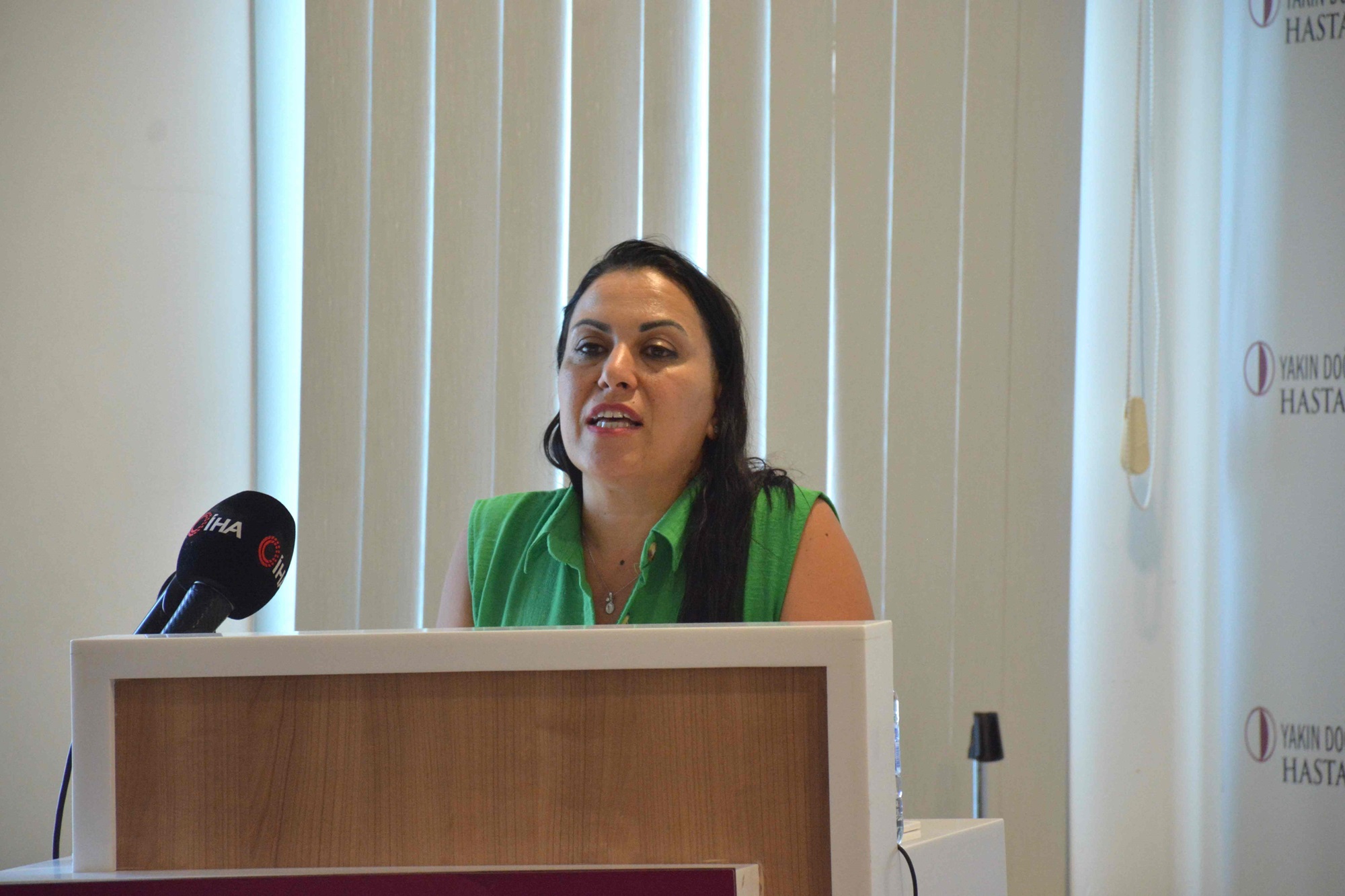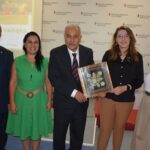
Methods of combating counterfeit food products were discussed at the “Imitation and Adulteration in Food” event organized by Near East University on World Food Safety Day.
The negative effects of fake food products on health were discussed at the “Imitation and Adulteration in Food” event organized by the Near East University Faculty of Agriculture, Department of Food Engineering, on June 7, World Food Safety Day.
Topics such as the effects of fake food products on health, the methods used to detect these products, the importance of quality control in the food industry, legal regulations and inspection processes were discussed at the event attended by Director of the Department of Agriculture Ercan Akerzurumlu, President of the Chamber of Food Engineers Beste Ōymen and many faculty members, researchers and students. In addition, tips for consumers to make safe food choices and issues of ensuring trust between the food industry and consumers were also discussed.
Following the opening speeches of Near East University Faculty of Agriculture Dean Prof. Dr. Özge Özden and Director of the Department of Agriculture Ercan Akerzurumlu, Near East University Faculty of Agriculture Department of Food Engineering faculty members Prof. Dr. Nevzat Artık and Dr. Şebnem Güler and Adana Olive Production and Marketing Cooperative (ZEYKOOP) President Dr. Mehmet Güler made presentations. At the event, which ended with a question-answer session, certificates of appreciation and handicraft made of cocoon were presented to the academics who made presentations.
Products where fraud is most common: Olive oil, milk, honey, saffron, fish and coffee
Near East University Faculty of Agriculture Department of Food Engineering faculty member Prof. Dr. Nevzat Artık said that 700 million people worldwide are affected by more than 200 diseases caused by contaminated food every year, and emphasized that 40 percent of these cases are children under the age of five.
Emphasizing the necessity of legal inspections in food safety, Prof. Dr. Nevzat Nakit said, “Together with legal responsibility and consumer awareness, the most effective way to prevent adulteration and counterfeiting is for employers and responsible managers in the food industry are educated, conscious and conscientiously responsible people.”
Prof. Dr. Nevzat Artık said that according to the data of the EU Food Fraud Network, false and misleading labeling ranks first in food fraud with 47 percent, and added “Using substitute products, diluting, adding or removing products are among the most frequently used tricks with a rate of 20 percent. Incomplete, inaccurate or altered reporting and intellectual property rights violations account for 17 percent of food fraud.”
Adana Olive Production and Marketing Cooperative (ZEYKOOP) President Dr. Mehmet Güler emphasized that the homeland of olives is the Eastern Mediterranean and said that 98 percent of the 20 million tons of olive production worldwide is carried out in countries bordering the Mediterranean. Reminding that approximately 1.7 million tons of olives was produced in Turkey in 2023 and 216 thousand tons of olive oil was produced at the same time, Güler said, “The lack of knowledge and technology, especially in small and medium-sized producers, increases the costs in olive and olive oil production.”
Emphasizing that HACCP safety certification has become mandatory for olives and olive oil in the European Union as of 2023, Dr. Mehmet Güler said, “In order to become competitive in the global market, the application of the HACCP system in the olive sector, like all food sectors, has become inevitable.”
Near East University Faculty of Agriculture Department of Food Engineering faculty member Dr. Şebnem Güler said that olive oil is one of the products where imitation and adulteration is most common, with 24 percent. She emphasized that olive oil is followed by milk, honey, saffron, fish and coffee.
Dr. Güler said that adding refined vegetable oils such as rapeseed, sunflower, soybean, cotton, corn, peanut, mustard, sesame, poppy, and different plant-derived oils such as hazelnut oil and avocado oil to natural olive oil are among the most common examples of adulteration. Dr. Şebnem Güler said that the marketing of Riviera type oils and refined edible pomace oils under the name of natural olive oil is also a serious problem.

Ercan Akerzurumlu: “Imitation and adulteration in food is not acceptable!”
Stating that imitation and adulteration in foods is a vital problem, Department of Agriculture Director Ercan Akerzurumlu said, “We are aware of how important scientific cooperation is in the fight against this.”
Ercan Akerzurumlu stated that counterfeiting in foods is the situation where the food product is presented as if it has properties that it does not have, and said that selling fruit syrup as grape molasses is one of these examples. Akerzurumlu stated that food adulteration can be defined as the addition of a foreign or cheaper substance to the natural content of the food, and that olive oil and honey are among the most frequently adulterated foods.
Giving information about the olive and olive oil production of the Turkish Republic of Northern Cyprus, Ercan Akerzurumlu said, “When we look at our island, we see that olive trees are located in natural areas. We have approximately 600 thousand olive trees and 11 thousand decares of olive grove area. Olives are an integral part of Cyprus culture and we have approximately 2,200 producers actively working in this field. We obtain 10-15 thousand tons of olives annually and produce around 1,500 tons of olive oil.”
Stating that they found that 20 of the 70 samples they collected from different regions during their inspections were adulterated, Akerzurumlu said, “We took penal action against the producers who made unfair profits and harmed human health.” Stating that the current analyzes have been sent to Ankara Food Control Laboratory Directorate, Ercan Akerzurumlu said, “We have started working to carry out all these analyzes in our own country. We will achieve this in the coming days.”

Prof. Dr. Özge Özden: “While we place food safety and sustainable agricultural practices at the center of our educational activities, we will continue to contribute to social awareness.”
In her opening speech, Near East University Faculty of Agriculture Dean Prof. Dr. Özge Özden stated that food safety is of vital importance not only for a healthy life but also for the economic and social well-being of societies, and pointed out that every year one in 10 people worldwide gets sick due to contaminated food.
Prof. Özden said that the number of foodborne diseases that occur as a result of food contaminated with bacteria, viruses, parasites or heavy metals has reached 200. Prof. Dr. Özden stated that access to quality and safe food is becoming more difficult day by day. Prof. Dr. Özge Özden; “As the Near East University Faculty of Agriculture, which includes the only Food Engineering Department in the TRNC, we place food safety and sustainable agricultural practices at the center of our educational activities, and we also continue to contribute to social awareness through events held open to the public.”




